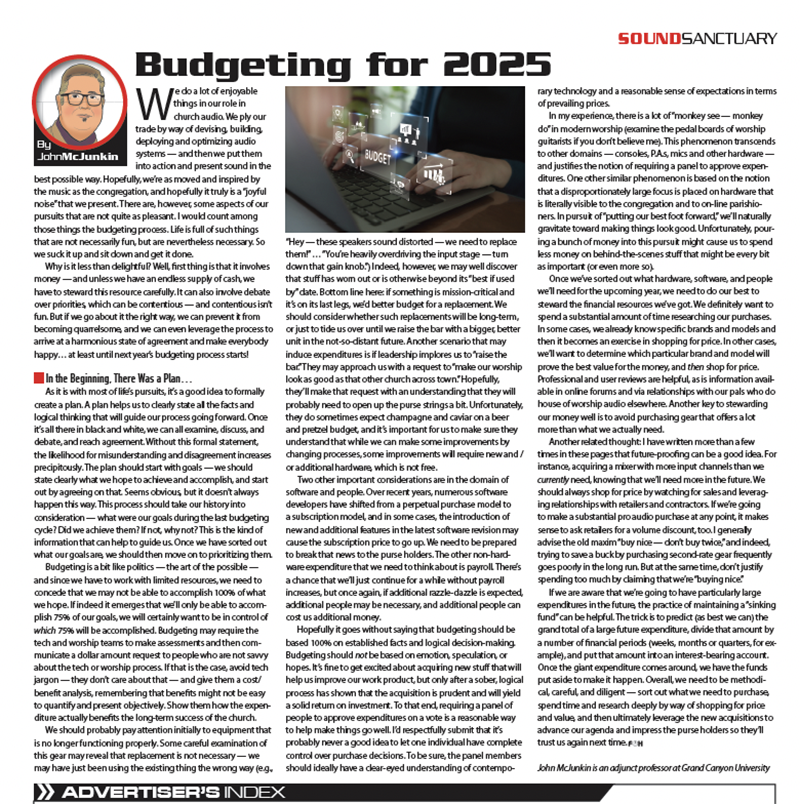Before we get into this month's writings, I want to make a few shout-outs to some of the readers. It always amazes me how intelligent and thoughtful "Sound Sanctuary" readers are. I know we all want to do a good job at our individual houses of worship, but maybe we all work a little harder because of Who we are really working for.
Anyway, recently I got an email from Issac Guerrero asking about mixing sound outside of the worship world. This interested me, because that is exactly what I do. I mix and install sound in both the worship world and the secular world. The actual work is the same, but they satisfy different areas of my life. My worship mixing tends to fill my spiritual bank account while my secular mixing fills my earthly one.
That said, my advice to Issac and any of you who want to work as a career engineer is to continue to pursue your dreams while constantly honing your skills at your house of worship.
For myself, after many years on the road, I started my own sound company (but that is another story).
{mosimage}Lastly, I got an email from Tom Herdt. He has a new sound system in his worship house, and the congregation is very pleased with the outcome. Tom sent me a picture of his decibel meter with spectrum analyzer listening to the old system. I could immediately see the potential problem. That picture was of a very important tool that Tom has, and that is what led me to this month's installment.
If your goal is to do a good job as an audio technician, you will need some good tools. Being able to test equipment and conduct minor repairs should be part to your job description. Obviously, the better you are at troubleshooting, the more valuable you are to you worship house, and God, for that matter. I am not exaggerating here. You are the link between your preacher, your worship music and the congregation. It is a very important job!
Toolbox Essentials
As we go over some of the essential tools you will need, just remember they are in no particular order of importance.
Okay, first let's start with a really good decibel meter. A digital one with a spectrum analyzer is ideal. You can check your SPL (sound pressure level) and see what frequencies are potentially offensive. These units can be a bit pricey, so you will need a financial endorsement from your church leaders (i.e., cash). For that matter, a good tool box in general will cost some dollars. So ultimately, your worship house will have to finance this venture, or you will have to pull some gold out of your pocket. Just remember, these tools are well worth it.
Okay, let's look for a quality cable tester. This very important tool is designed to check the condition of all common cable types that you will use in your house sound system. Get one that will test XLR, TRS, RCA, mini jacks, ¼ inch phone jacks and Neutrik speaker connectors at the least. A cable tester with a built-in tone generator is always handy for balancing your system (along with other uses). In addition to testing cables, some testers will check batteries, which is always nice.
As we all know (or have experienced directly), a bad cable can distort or just ruin the sound of the most expensive audio systems. With that fact in mind, when you are shopping for cables, always buy good ones.
Next, you will want to acquire a simple electrical outlet tester. Since your house sound system is all about the electricity, it is wise to check the health of your outlets. An outlet tester is a simple device but it will determine if the outlet is energized (electricity is present) and whether or not it is grounded. Proper grounding of your outlets is a must to ensure optimum performance of your audio equipment. Also, the test tells you whether the outlet is wired correctly.
A good soldering iron is another necessary item for your tool box. Of course, knowing how to solder is also a very important skill. In the near future, I will dedicate a column to proper soldering. This is an ability that can serve you for a lifetime. Personally, I preferable a soldering iron over a solder gun. The gun just produces too much heat. Your best choice is a 25W-40W pencil-type soldering iron. The pencil will produce 500 to 800 degrees, which is optimum for your repair work. Also, a 60/40 rosin core soldering wire is considered ideal for audio solder repairs. I know some of you out there think silver solder is the best, but it can be a bit harder to work with. Anyway, 60/40 refers to 60 percent tin and 40 percent lead. The rosin center core is a non-acid solvent that cleans the metals so they may be joined properly.
To round out your soldering arsenal, you will to procure a pair of wire strippers, pair of needle nose pliers, diagonal wire cutters and a micro screwdriver set. With these tools in your box, you can troubleshoot and repair a whole list of audio problems.
Bust the Dust
That said, there are some other tools that will help prevent (or at least delay) many problems from happening. These tools are designed to remove and control of dust. As you know, dust is our sworn enemy. Dust build-up in your mixing console can lead to all kinds of electrical chaos (even shorts in the board). So, we must attempt to remove it whenever we can.
The following tools will help in your efforts. A simple can of compressed air can be used to remove dust buildup in the knobs and faders of your house mixing console. It can also help eliminate dust from outboard gear (or any other gear you may have). A soft paint brush can be used to sweep off surface dust and particles (like donut crumbs). I own a couple of paint brushes and they can really get the job done quickly and quietly. You last piece of gear should be a small vacuum. You will use this tool to can get the dust out of those hard to reach areas. You want one that is powerful enough to draw out the dust and dirt – but not too powerful. The last thing you want is to have it suck the knobs or buttons off your board!
So, now that we have all our tools in order, don't forget the tool box to hold them. There is nothing better than showing up to the gig with a briefcase full of toys (tools) and the knowledge to use them.



